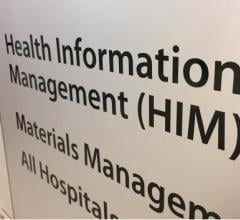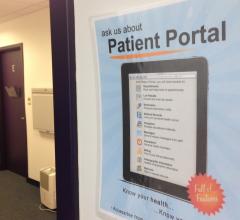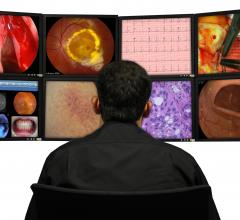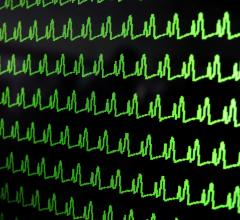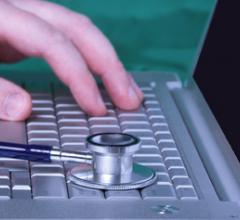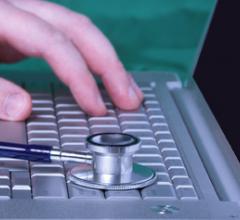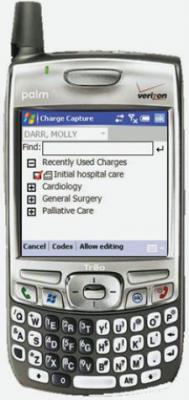
Treo by PatientKeeper shown on a Verizon wireless phone.
The emergence of ultra portable computing technology and the availability of new communication modalities such as Wi-Fi have taken the practice of medicine to a new level. Allowing healthcare professionals to remotely access information not only at the point of care, but also outside the hospital improves efficiencies. Physicians no longer necessarily need to be by the bedside in order to diagnose and treat patients.
Integration of compact operating systems, such as Palm OS and Windows Mobile, into a hospital's information system provides endless opportunities to access critical patient data.
Even though advances in mobile computing have facilitated the exchange and management of patient information, inherent security risks with accessing healthcare information “without bounds” may exist. These risks include increased access to personal and sensitive information by healthcare professionals, as well as other workers. This can lead to information misuse and abuse. Although safeguards are in place for keeping personal medical information secure, such as the Health Insurance Portability and Accountability Act (HIPAA) of 1996, mobile computing might compromise the law that protects privacy of health information.
However, security issues appear to have not slowed the adoption of mobile technology in accessing and exchanging healthcare information. On the contrary, the practically ubiquitous adoption of mobile technology to access medical records is one trend that is on the rise.
Gregg Malkary, president of Spyglass Consulting Group, a firm specializing in healthcare information technology, says “mobile devices are emerging as the stethoscope of the 21st century.”
“Physicians nationwide are independently purchasing mobile devices with stand-alone clinical solutions to retrieve accurate, up-to- date information to help diagnose illnesses, determine treatment protocols and prescribe medications,” Malkary said.
Progressive Technology
One of the companies on the forefront of mobile computing to access medical data is PatientKeeper Inc. (Newton, MA).
“The PatientKeeper Platform provides physicians with a broad portfolio of integrated applications designed to automate the physician workflow…throughout their entire day,” said Stephen Hau, co-founder and vice president of Marketing and Business Development.
PatientKeeper has patented technology for synchronization scores of the patient information across multiple enterprises wirelessly and for automating billing. Both applications are geared toward improving efficiencies. PatientKeeper offers a complete physician information system, which allows physicians to prescribe medications, order lab reports and check for drug interactions in addition to billing medical charges directly from a hand-held computer or SmartPhone.
And while the PatientKeeper Platform is primarily marketed toward physicians, the company is working on applications for other hospital-based healthcare professionals.
Hau indicates that mobile computing for physicians has evolved significantly over the last three years with the availability of more powerful and efficient mobile computing tools.
PatientKeeper is not a “one solution” company, says Hau. Unlike other mobile computing applications for the healthcare industry that might specialize in one or two software applications — such as e-prescribing or electronic order entry — PatientKeeper strives to provide a range of comprehensive and harmonized solutions that can handle the daily exchange and management of patient information remotely.
The platform’s applications are organized into four suites. For example, the PatientKeeper Patient Care Suite comprises seven stand-alone applications, which interface across other PatientKeeper applications and suites.
• Via Mobile Clinical Results physicians can access patient information.
• Physicians can use Physician Portal to access patients' medical history via a Web browser.
• Through ePrescription physicians can prescribe paperless prescription securely.
• The Ambulatory Order Entry application is used to order a variety of outpatient procedures, including lab and diagnostic imaging tests.
• The Task Manager ensures patients are followed from admission to discharge, in addition to ensuring that patients receive the correct treatment.
• The Clinical Surveillance application monitors and tracks key patient populations.
In addition to the “Patient Care Suite,” the company offers the “Charge Capture Suite” for patient billing, the “Documentation Suite” for accessing, exchanging and electronically signing-off on documents, and the “Communication Suite” for quickly connecting calls and securely transmitting text or email messages wirelessly.
“PatientKeeper acts as an extension of existing IT systems with a complete set of integration options,” said Hau. “Customers can choose whichever suite to integrate into a system. Since PatientKeeper applications are scalable, customers can add applications as needed.”
According to Hau, PatientKeeper provides sophisticated tools to support the physicians' entire workday. The company has forged partnerships with Cingular Wireless, Verizon and Sprint to facilitate the access and exchange of information wirelessly. With GE Healthcare and GE's Centricity Physician Office Mobile (Powered by PatientKeeper) physicians can simultaneously view patients' electronic medical records, use clinical decision support tools, and accurately record charges for medical treatments, all with one mobile device.
Satisfied Customers
Physicians who have put the technology into practice indicate enthusiasm about its power to put information into their hands.
“[PatientKeeper] is the best patient care tool since the stethoscope,” stated Gregory A. Ator, M.D., chief medical information officer of the Kansas University Hospital.
“The user interface on the PatientKeeper system is extremely intuitive and clearly designed to suit the doctor's daily workflow,” said Paul Klotman, M.D., chairman, Department of Medicine, Mount Sinai School of Medicine.
And Don Burt, M.D., president, Berkshire Faculty Services at Berkshire Health System, said when his MEDITECH system was temporarily down, “our doctors could still access essential patient information through PatientKeeper."
Steve Green, M.D., associate director, Cardiac Catheterization Laboratories at North Shore University Hospital, has been using PatientKeeper for approximately two years and says the system is highly flexible. Dr. Green primarily uses PatientKeeper's Clinical Results and Patient Capture applications to keep track of his patients.
“It's a wonderful tool,” said Dr. Green. “Billing [index] cards are ancient history.”
He knows the location and time of his patients as soon as they are admitted to the hospital by “syncing up” his mobile device. The ability to synchronize his Pocket PC on demand, sort patients geographically (by floors and hospital wings) helps facilitate rounds and capture billing directly improves workflow. During his clinical consultations and rounds, Dr. Green frequently uses the same billing codes. PatientKeeper stores the last 10 diagnoses and Dr. Green says this feature simplifies billing significantly.



 June 14, 2024
June 14, 2024 
